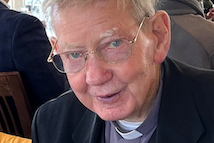Don't be deceived by revised assisted dying bill' say Christian doctors
On the eve of the first reading of Lord Joffe's revised bill on assisted dying in the House of Lords, the Christian Medical Fellowship, which represents 5,000 UK doctors, yesterday issued a warning to parliament and the public not to be deceived by this further move to legalise physician assisted suicide. Lord Joffe had earlier stated his intention to introduce a revised Bill aimed at legalising physician assisted suicide (PAS) but not euthanasia along the lines of the Oregon model, after the debate on the House of Lords Select Committee Report on the Assisted Dying for the Terminally Ill Bill next Monday 10 October. General Secretary, Peter Saunders said: "We remain opposed to this move to make assisted dying more palatable. A lot of pressure has been exerted to convince peers and the public that PAS is not 'euthanasia proper'. But the key issue is intention. There is no moral difference between PAS and euthanasia. In both cases what the doctor means to do is to bring about the death of the patient. He or she is the moral agent without whom the death could not happen. PAS is simply euthanasia one step back. "Allowing PAS would effectively legalise euthanasia as well due to the need to provide 'help' to incapacitated patients not able to end their own lives, and, in the case of the well-highlighted problems achieving 'completion', requiring the doctor to step in and finish the job. "PAS would also inevitably introduce an element of coercion by placing pressure on patients to request PAS so as not to place a burden on relatives, carers or a society short of resources. This was the key argument that persuaded the last Lords' Committee considering the issue to oppose any change to the law in 1994. Lord Walton concluded that it was 'virtually impossible to ensure that all acts of euthanasia were truly voluntary' and that 'any liberalisation of the law in the United Kingdom could not be abused'. "The 1994 Lords' Committee were also concerned that 'vulnerable people - the elderly, lonely, sick or distressed - would feel pressure, whether real or imagined, to request early death.' It is striking that of reasons given for people requesting PAS in Oregon, 35% indicated that they feared being a burden. This is why another dozen US States have rejected similar legislation - and why the Supreme Court is reviewing Oregon's law right now." "There is a real need" Saunders continued, "for individuals to be informed of the issues and not to buy in to the deception that PAS is a softer option. We must persist in standing firm against a move down the 'slippery slope''. "The RCGP (Royal College of General Practitioners) Council, after a lengthy consultation seeking the views of members, in which responses were overwhelmingly in favour of rejecting a change in the law, affirmed on 16 September 2005 that 'with current improvements in palliative care, good clinical care can be provided within the existing guidelines and that patients can die with dignity. A change in legislation is not needed." Saunders concluded: "The vast majority of calls for euthanasia and PAS are really calls for good medical care. Requests for euthanasia and assisted suicide are extremely rare when a patient's physical, social, emotional and spiritual needs are properly met. Our priority must therefore be to make the best possible whole-person care more widely available." Source: Christian Medical Fellowship


















